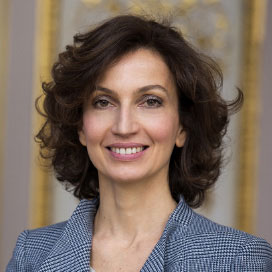About UNESCO
The United Nations Educational, Scientific and Cultural Organization (UNESCO) was established on November 16, 1945. Its Charter was adopted in November 1945 at the London Conference and entered into force on November 4, 1946, after the deposit of the acts of its adoption by 20 signatory states. UNESCO headquarters is located in Paris.
The main goal of the Organization is to promote peace and security by expanding cooperation between peoples in the field of education, science, and culture in the interests of ensuring universal respect for justice, legality, and human rights as well as fundamental freedoms proclaimed in the UN Charter for all peoples without distinction of race, gender, language, or religion.
UNESCO is developing educational tools for the formation of citizens of the future, free from hatred and intolerance. The institution makes efforts to ensure that every child and citizen has access to quality education. By promoting the preservation of cultural heritage and protecting the equal dignity of all cultures, UNESCO strengthens the ties between them. The Organization helps develop research policy as a driving force for development and cooperation. UNESCO protects freedom of expression as a fundamental right and a necessary condition for democracy and development. The Organization acts as a laboratory of ideas, sets international standards, and implements cooperation programs that promote the free exchange of ideas and knowledge
UNESCO’s current activities are implemented within the framework of several dozen specialized programs embedded in the framework of five thematic sectors: education, natural sciences, social sciences, culture, and communication and information.
Organization members
UNESCO unites 194 member states and 12 associate members who are not subjects of international relations.
UNESCO bodies
UNESCO has three bodies: the General Conference, the Executive Board, and the Secretariat.
General Conference. The General Conference is the highest governing body of UNESCO and includes representatives of all member states of the Organization.
Each member state has one vote at the General Conference, regardless of the size of the population and the size of its contribution to the budget. The General Conference determines the direction and general line of UNESCO’s activities and also adopts the Organization’s program and budget for the next two years. It elects members of the Executive Board and appoints the Director-General every four years.
Regular sessions of the General Conference are held every two years. The working languages are Arabic, Chinese, English, French, Russian, and Spanish.
Executive Board. The Executive Board is the elected governing body of UNESCO consisting of 58 member states.
The Executive Board prepares the work of the General Conference and oversees the proper implementation of the decisions taken during it.
Regular sessions of the Executive Board are held twice a year. The working languages are Arabic, Chinese, English, French, Russian, and Spanish.
Secretariat. The Secretariat is the executive body of UNESCO acting under the direction of the Director-General of the Organization. Currently, about 700 employees work at UNESCO headquarters and 53 field missions.
Director-General
 Audrey Azoulay
Audrey Azoulay
Audrey Azoulay, France
Director-General of UNESCO, in office since November 2017
Documents
Charter of the United Nations Educational, Scientific and Cultural Organization
Adopted in London on November 16, 1945. In the 2018 edition.
Contact Us
Official website: unesco.org
Official website in Russian: ru.unesco.org
Email: info@unesco.org
Postal address: 7 place Fontenoy, 75352 Paris 07 SP, France
Phone: +33 (0)1 45 68 10 00
